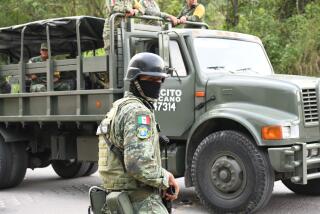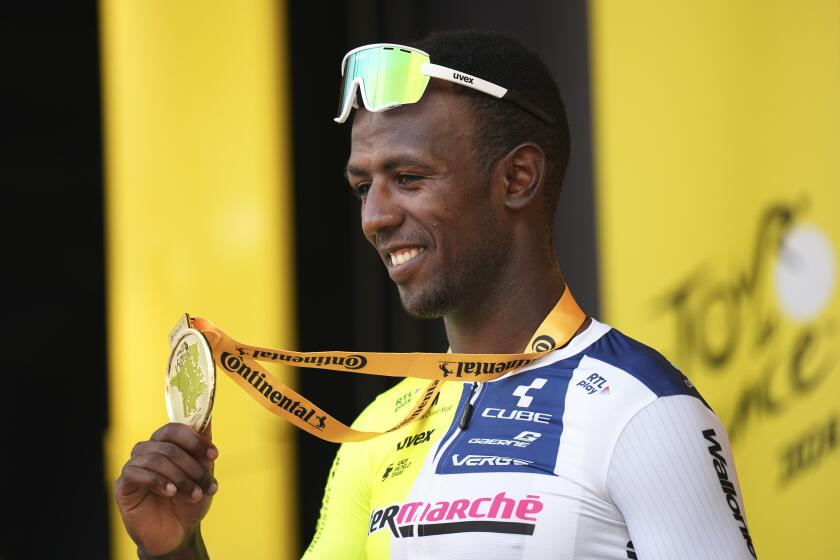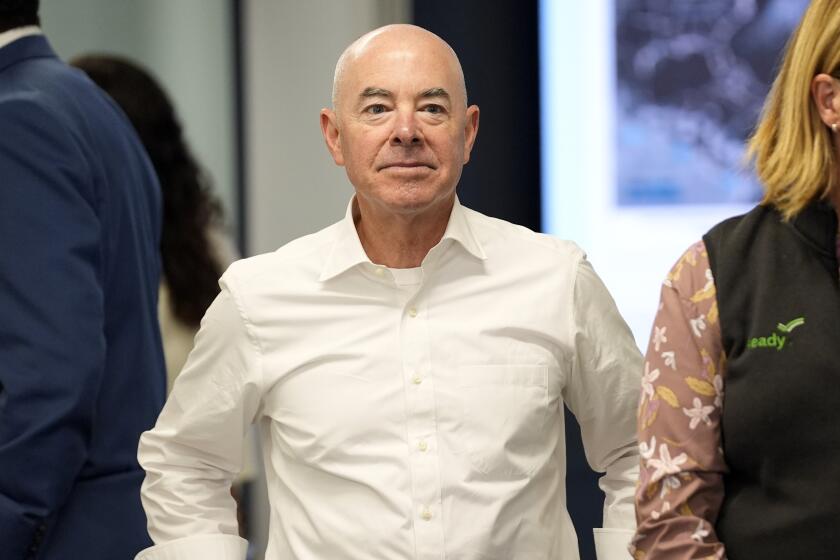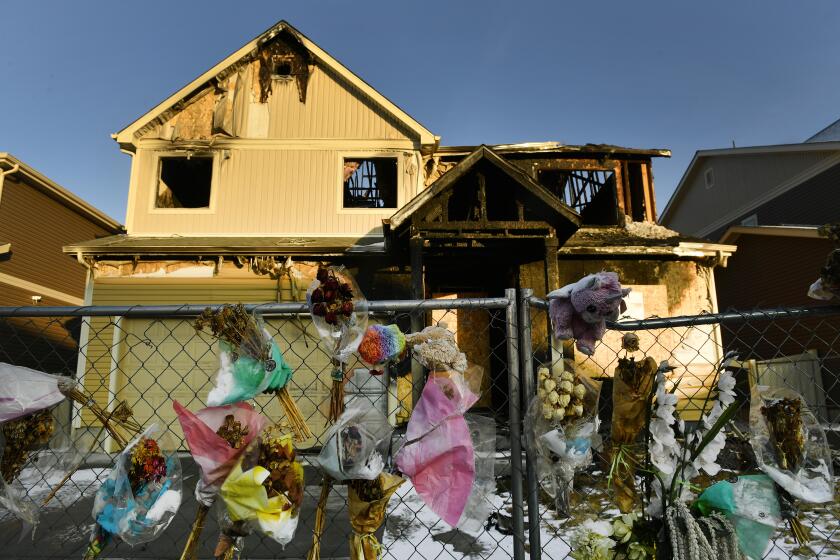U.S. Vietnam Veterans Return to ‘War Zone D’ on Missions of Goodwill : Asia: About 200 vets and their families have come to Dinh Quan and Phu Ngoc over the last three years to build and staff medical and dental clinics. Their goals are reconciliation and healing.
American soldiers used to call this “Indian Country.”
On maps, the town of Dinh Quan was part of War Zone D, a lethal communist stronghold of scruffy jungle and stately rubber plantations along National Highway 20, about 80 miles northeast of Ho Chi Minh City, formerly Saigon.
A quarter-century later, a group of middle-age American evangelical Christians--most of them combat veterans of the Vietnam War--are spending their vacations in Dinh Quan.
During the last three years, about 200 veterans and their families have flown halfway around the world at their own expense to help build and staff medical and dental clinics here and at the nearby village of Phu Ngoc.
Ironically, some of the impoverished Vietnamese and ethnic Chau Ro and Montagnard farmers who use the health facilities are former Viet Cong guerrillas or sympathizers.
The concrete-block clinics, stocked with medicines and surgical supplies donated by U.S. doctors and health-care companies, have been designated “model primary health facilities” for the entire country, according to the Ministry of Health in Hanoi, capital of the now-unified communist Vietnam.
“Our mission is reconciliation and a little healing--on both sides,” said former Marine Sgt. James Haldeman, an oil company chemist from Humble, Tex. “We’re not here to apologize to anyone or to do any penance. We’re not war criminals.”
With the temperature approaching 100 degrees in the shade of a eucalyptus tree, Haldeman squared a teak plank with a primitive plane. He was surrounded by curious Chau Ro tribesmen.
Haldeman and about 30 other American combat veterans of Vietnam use their vacations to work with Vets With a Mission, a nondenominational fellowship that eschews politics in favor of humanitarian projects such as building hospitals and renovating orphanages. The two clinics here have cost the organization about $42,000 to build and operate.
Among the veterans are doctors and dentists, clergymen, school guidance counselors and corporate executives. But about a third of the team never served a day in uniform.
Nurse-midwife Carol Rafferty of Houston says she was drawn to Vietnam by the suffering on both sides. “On my last trip I delivered two babies,” she said. “I’m not a veteran, but my generation was marked by Vietnam. The Lord said this is where I could make a difference.”
This day, Rafferty examined a dozen pregnant villagers, attended to two women in labor and treated scores of everyday ailments--all before lunch. In a country that spends less than $1 a year on health care for each of its 71 million citizens, it’s easy to feel needed, she said.
Vets With a Mission is one of about 160 U.S. goodwill organizations that are building dispensaries, performing surgery on disfigured children and delivering medical supplies and Bibles in this poor Southeast Asian nation. Some volunteers walk old battlefields to call attention to unexploded shells and mines that remain deadly 19 years after the war ended.
Most groups say their aim is to reconcile former enemies despite a political minefield of corruption, internal travel restrictions and arbitrary customs duties. Vets With a Mission started working in Vietnam in 1988, when the country was still considered something of an international outlaw because of its occupation of neighboring Cambodia.
As relations between Hanoi and the West have warmed, the evangelicals have built two primary health care centers and six clinics, delivered 15 loads of medical supplies valued at more than $6 million, rebuilt an orthopedic hospital, financed an orphanage for children with polio and distributed 10,000 Vietnamese-language Bibles.
A secular humanitarian group, Washington, D.C.-based Orthopaedics Overseas, last year sent 18 physicians to Vietnam to teach at hospitals and medical schools in Ho Chi Minh City and Hue. The volunteers, most of them Vietnam veterans, donated 43 weeks of work valued at nearly $600,000.
“Every one of us comes back on a high,” said Dr. Lewis Zirkle, 53, an orthopedic surgeon from Richland, Wash., who has returned to Vietnam five times since serving in the war.
Zirkle said he doesn’t try to duplicate operations Vietnamese doctors are qualified to perform, but instead concentrates on giving medical school lectures, improving medical libraries and establishing professional relationships. An expert on damaged bones and joints, Zirkle typically works with 20 doctors and 80 medical students during a four-week trip.
“The first time we came here with a mission to destroy and kill,” said William R. Kimball of South Lake Tahoe, Calif., president of Vets With a Mission. “Now our mission is to heal.”
To advance the group’s humanitarian agenda, said Kimball, a former mortar-man who has made 14 return trips to Vietnam, the veterans often cooperate with former battlefield enemies as partners in local development schemes.
“There is a genuine bond of camaraderie between brothers in arms,” said Kimball, a Protestant minister and author of 10 books on Vietnam. “The VC and North Vietnamese soldiers respected us on the battlefield, and that certainly accounts for part of their cooperativeness today.”
Other veterans, such as former Marine Sgt. Roger Helle, put it more bluntly. “The rubber hits the road when you’re sitting across from someone who once was trying to kill you,” said Helle, who served three tours of duty in Vietnam and now runs an outreach program for troubled teen-agers in Colfax, Iowa. “But both sides fought for a cause. Now we share a healthy mutual respect born of the fellowship of suffering.”
The returning volunteers say they are surprised at their warm welcome. It begins at Ho Chi Minh City’s Tan Son Nhut International Airport, where immigration cards have a special check box for “returning war veteran,” and often runs well into the night over dinner and beer with Vietnamese doctors and bureaucrats who once fought on the other side.
In private, some Vietnamese voice sentiments that could get them arrested, or at least censured by Communist Party officials. Resentful of Hanoi’s communist rulers, doctors at a Ho Chi Minh City hospital told an American correspondent that they are grateful for the battlefield sacrifices of U.S. soldiers and see their return as a promise of change.
“Ask any Vietnamese on the street what he thinks of the returning American war veterans,” said Do Cong Minh, a Vietnamese Foreign Ministry spokesman. “We shake their hands; we respect them; we say the American vets are our friends.”
More to Read
Start your day right
Sign up for Essential California for news, features and recommendations from the L.A. Times and beyond in your inbox six days a week.
You may occasionally receive promotional content from the Los Angeles Times.






